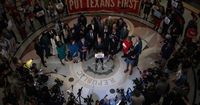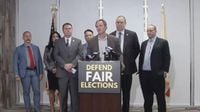California’s political landscape has erupted into a high-stakes battle over redistricting, as Democratic and Republican leaders race to redraw congressional maps in response to a wave of partisan moves sweeping the nation. The drama, unfolding in August 2025, pits California Governor Gavin Newsom against former President Donald Trump and Texas Republicans, with both sides deploying rapid-fire tactics and fiery rhetoric that have left voters, legal experts, and political observers questioning the future of American democracy.
For Newsom, the fight has taken a personal turn. In recent weeks, he’s adopted Trump’s signature social media style—using all caps, brash slogans, and even tongue-in-cheek self-praise—to rally support for California’s own redistricting campaign. The governor’s X (formerly Twitter) account has exploded, gaining 250,000 followers since August 1, 2025, boasting an engagement rate over 50%, and racking up more than 1.5 million profile visits, according to ABC 7 News.
“Final warning Donald Trump – maybe the most important warning in history! Stop cheating or California will redraw the maps. And guess who will announce it this week? Gavin Newsom (many say the most loved & handsome governor) and a very powerful team. Don’t make us do it!!!! Thank you for your attention to this matter,” Newsom’s team posted, echoing the style of Trump’s own online missives. Another post declared, “Make the maps great again! Big beautiful rally today. Thank you for your attention to this matter!”
The strategy, experts say, is deliberate—and effective. “Not only has Newsom become much more aggressive in his criticism of Trump, but by imitating him, he is reminding the political community that this type of behavior from an elected official is out of the ordinary,” Dan Schnur, a political communications lecturer at USC and UC Berkeley, told ABC 7 News. Karen North, a professor at USC’s Annenberg School, added, “To become entertaining and engaging like this, brash and shocking is a great way to get attention, and it’s clearly working in that regard.”
The stakes couldn’t be higher. The California Legislature, dominated by Democrats, introduced three bills on August 19, 2025, proposing a constitutional amendment to allow lawmakers to take control of redistricting if another state—like Texas—redistricts early. This move is a direct counter to Texas Republicans, who, at Trump’s urging, recently adopted a mid-decade redistricting plan designed to secure more GOP seats in Congress. Trump celebrated the Texas move on social media, writing, “Big WIN for the Great State of Texas!!! Everything Passed, on our way to FIVE more Congressional seats and saving your Rights, your Freedoms, and your Country, itself.”
California Democrats wasted no time responding. Newsom, flanked by fellow lawmakers, announced the legislative success in putting a new, Democrat-friendly congressional map before voters in the November 4, 2025 special election. “We got here because the president of the United States is one of the most unpopular presidents in U.S. history,” Newsom said, as quoted in the Los Angeles Times. “We got here because he recognizes that he will lose the election, [and that] Congress will go back into the hands of the Democratic Party next November.”
But the path has been anything but smooth. Four Republican legislators filed an emergency petition with the California Supreme Court on August 19-20, 2025, aiming to halt the Democrats’ effort. They argue that the swift legislative action violates the state’s constitutional 30-day waiting period for voting on such measures. “Instead they have bypassed those rules, and that is unconstitutional,” said District 3 representative James Gallagher, according to Patch. “We will be taking this to the Supreme Court because we’re not going to allow this stuff to happen anymore. It’s not right.”
Senator Megan Dahle and other Republicans contend the proposed amendment flies in the face of public sentiment, which they say favors independent, non-partisan redistricting. “The California voters have said overwhelmingly that they support independent non-partisan redistricting, to avoid political games like this one,” Dahle’s press secretary, Bruce Ross, told Patch. Yet, Democrats argue the move is a necessary defense against Republican gerrymandering efforts in Texas and other states.
Polls reveal a divided electorate. A UC Berkeley Institute of Governmental Studies poll for the Los Angeles Times found that 46% of registered California voters support the redistricting amendment, 36% oppose it, and 18% remain undecided. Meanwhile, 59% believe Newsom should continue his aggressive approach toward Trump, while 29% prefer a more cooperative stance.
The partisan warfare isn’t confined to California and Texas. Trump has hinted that other Republican-led states, including Florida and Indiana, may soon follow Texas’s lead. “Texas never lets us down. Florida, Indiana, and others are looking to do the same thing,” Trump wrote online, according to the Los Angeles Times. The result? A nation increasingly divided into blue and red power centers, with millions of minority-party voters at risk of losing their voices in Congress.
The speed and brazenness of the current redistricting race is unprecedented, experts say. Sam Wang, president of the Electoral Innovation Lab at Princeton University, told the Los Angeles Times that gerrymandering had been declining thanks to court battles and independent commissions, but the recent actions by Texas and California threaten to reverse that progress. “America is headed towards true authoritarian rule if people do not stand up,” warned Texas state Rep. Gene Wu, a Democrat, during a call with reporters.
Legal challenges loom large. The Supreme Court’s 2019 ruling made it harder to challenge partisan gerrymandering, with Chief Justice John Roberts writing that such disputes “present political questions” lacking reliable legal standards. Nonetheless, advocacy groups like the Legal Defense Fund and the Mexican American Legal Defense and Educational Fund are watching closely, particularly for any violations of the Voting Rights Act that could disenfranchise Black or Latino voters. “Fair representation isn’t optional in this country. It’s the right of all Americans to [have] equal voting power,” said Sara Rohani, assistant counsel with the Legal Defense Fund.
For now, both sides are focused on shaping public opinion ahead of the November vote. Newsom, in a YouTube Live video, accused Trump of not believing in the rule of law but rather “the rule of Don; period, full stop.” He praised the Legislature for moving quickly and expressed confidence that voters will back the measure, despite polling suggesting a sluggish start to the campaign.
As the redistricting fight intensifies, the outcome in California could set a template for other states—and determine not just the balance of power in Congress, but also the very nature of American democracy in the years ahead.


